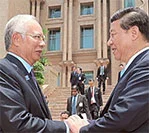WHEN Malaysian premier Datuk Seri Najib Tun Razak steps on the tarmac of the Beijing International Airport tomorrow to begin his official visit to China, he will be taking a giant step for Malaysia in cementing flourishing bilateral ties.
Najib has made many previous official visits to China, with the first being in 1992 when he was Defence Minister.
But this visit is special and carries with it great significance.
It is not coincidental that the visit was scheduled to coincide with Tun Abdul Razak Hussein’s historic visit to China in 1974.
Indeed, Najib’s visit not only marks the 40th anniversary of Tun Abdul Razak’s visit but it is also a celebration of four decades of formal relations between both countries.
Cut from the same cloth as his father, Najib is a strong believer in the positive role that China could play in regional peace and prosperity, and in the importance of engaging China.
To this end, Najib walked on the bridge laid by his father and contributed to strengthening this bridge by firming up its foundations.
For example, as Education Minister, Najib was instrumental in supporting the establishment of the Chair of Malay Studies at the Beijing Foreign Affairs University. During his tenure as Defence Minister, Malaysia made its first arms purchase from China with an order of 18 FN-6 surface-to-air missiles and signed the Memorandum of Understanding on Defence Cooperation.
Malaysia and China will chalk up another milestone as both militaries conduct their first joint military exercise, which is planned for this year.
This spirit of friendship and cooperation is also evident in other areas, most notably in trade and people-to-people exchanges.
China is Malaysia’s largest trade partner while Malaysia is China’s largest trade partner in Asean and third in East Asia, after Japan and South Korea.
Last year, 1.79 million Chinese tourists visited Malaysia, which is an astonishing 283% increase from 10 years ago.
The official visit to commemorate the 40th anniversary milestone is as much as about history and past achievements as it is about the future of bilateral relations.
Malaysia’s relations with China have largely been rosy, and we have benefited enormously from the latter’s economic prosperity and ascendance as the world’s second largest economy.
However, like all relationships, it is not without issues and concerns.
An immediate priority is to regain the confidence and trust of the Chinese people that have been visibly shaken in the wake of the MH370 tragedy.
One cannot begin to imagine the pain and anguish borne by the families and friends of the passengers and crew of the ill-fated airliner.
With 64% of the victims, the tragedy is felt strongest in China.
The Malaysian authorities must endeavour to regain the lost trust of the Chinese people by providing closure to the tragedy.
This is a national mission that Malaysia cannot fail.
The reason for this undertaking is not to woo back Chinese tourists to Malaysian shores.
Tourist dollars are peripheral to the importance of regaining the goodwill and friendship of the Chinese people.
Malaysia facilitated China’s engagement with Asean when it invited the latter’s foreign minister, Qian Qichen to attend the opening session of the 24th Asean Ministerial Meeting in 1991, which paved the way for China to become Asean’s full dialogue partner in 1996.
As Malaysia prepares to take over the chairmanship of Asean in 2015, it has yet another opportunity to perform the historical role of serving as a bridge between China and Asean.
There is no denying that China’s relations with Asean have been rocky in the last few years owing to the South China Sea disputes.
Sabre-rattling and low-level naval clashes in the Paracel Islands between China and Vietnam in the last few weeks have been unnerving and raised the spectre of escalation and open warfare.
Fresh from the 24th Asean Summit in Nay Pyi Taw, Malaysia should convey Asean’s concerns to the Chinese leadership.
Putting out a bush fire is easier than fighting a firestorm. Malaysia should speak to China in a sincere and frank manner, as what is expected of a true friend.
The 40th anniversary landmark should also be a sign of the maturity in the bilateral relationship.
Indeed, Malaysia and China agreed to broaden and upgrade the relationship to a “comprehensive strategic partnership.”
By agreeing to this initiative, both countries agree to seek closer collaboration on a wide range of issues, including security, which had hitherto been placed on the back burner.
For this partnership to reach its full potential, Malaysia and China should have the confidence, trust and political will to go beyond the niceties of diplomacy and bravely tackle difficult and even contentious issues.
The low hanging fruits in the Malaysia-China harvest are fast depleting, and we need to stand on each other’s shoulders to reach the bounty on the upper parts of the tree.
Article by Dr Tang Siew Mun which appeared in The Star, 26 May 2014.





